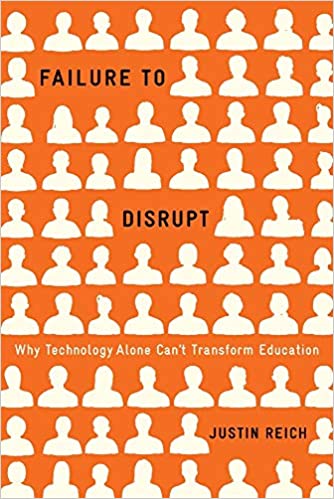You have /5 articles left.
Sign up for a free account or log in.
 Failure to Disrupt: Why Technology Alone Can’t Transform Education by Justin Reich
Failure to Disrupt: Why Technology Alone Can’t Transform Education by Justin Reich
Published in September 2020
Justin Reich is the OG of MOOC research. Patient zero when learning science and scaled online education first collided. As a researcher at Harvard and then MIT, Reich and his collaborators conducted the foundational investigations in which subsequent research on postsecondary online learning at scale has been built.
I'm not sure if Reich is as famous outside of learning science and online education circles as he is inside. He should be. Maybe his important new book, Failure to Disrupt, will bring Reich to a broader academic audience.
Failure to Disrupt is exquisitely timed to our pandemic moment. While not about higher ed during COVID-19, as Reich tells both a longer story and one that encompasses both postsecondary and K-12 education, the book should be required reading for everyone thinking about the post-pandemic university.
Higher education's relationship with technology calls to mind the quote attributed (perhaps erroneously) to Mark Twain that "history doesn't repeat itself, but it often rhymes." The next educational technology hype bubble will be different from the last one, but if we are not careful, it will do just as much damage when it inevitably pops.
The last ed-tech bubble to inflate was MOOC mania, peaking in 2012 with the New York Times story "The Year of the MOOC." This massively open online course bubble, which Reich tried his best to slowly deflate with rigorous data-driven scholarship, is at the heart of Failure to Disrupt.
Reich has no interest in piling on to MOOCs, as he recognizes that higher education and the leading platform providers (edX and Coursera) are mostly over the "open" part MOOCs. Today, the real story is about (paid) online learning at scale and the shift to noncredit alternative credentials and new low-cost online degrees.
For Reich, the MOOC story is illustrative of the tendency of both techno-enthusiasts and wannabe education reformers to inappropriately apply simplistic business thinking to the complex realities of educational ecosystems. If Amazon can "disrupt" retail and Netflix can "disrupt" theaters, why can't scaled online learning "disrupt" higher education?
As Reich goes into great detail in pointing out, however, universities (and schools) don't operate like businesses. Learning is enormously complex, and the structures that have evolved over many decades (or longer) at every level of education do not disappear when a new technology is introduced. Instead, new technologies get grafted on and absorbed by existing organizational structures and cultural norms.
Failure to Disrupt is an argument for educational tinkering over radical disruption. Reich sees potential in scaled online learning to benefit some learners in some circumstances. Still, he wants to see careful research done on where it is appropriate to apply new digitally mediated educational methodologies and where it is not.
As Reich points out, low-cost scaled online learning programs may work particularly well in areas of skill acquisition. As his research has also demonstrated, low-cost scaled online learning programs are most likely to benefit those who already have achieved a higher level of education. For many areas of teaching and learning, and for many learners, educational environments that are not built around an intimate educator/student coaching and feedback model will be ineffective.
We need good research -- and more investment in learning science -- to figure out how to effectively iterate toward leveraging technologies to drive improvements in access and lower costs.
My hope is that Failure to Disrupt gets read equally among ed-tech enthusiasts as ed-tech skeptics. Just as it is prudent to question any claims related to technology-powered "leaps" in education and learning (beware VR and adaptive learning platforms), we should not dismiss the possibility of some nonincremental changes.
I'm particularly excited about low-cost scaled online master's degrees in areas of business, education and technology. But I've also take Justin Reich's message to heart that success will depend on investments in careful research (and a willingness to rethink our assumptions), as much as in the evolution of enabling educational technologies. It is in that middle area -- of experimentation and evidenced-based/data-driven practices -- that Reich wants to see the educational ecosystem evolve.
Reading and talking about Failure to Disrupt should be a prerequisite for any big institutional learning technology initiatives coming out of COVID-19.
What are you reading?




